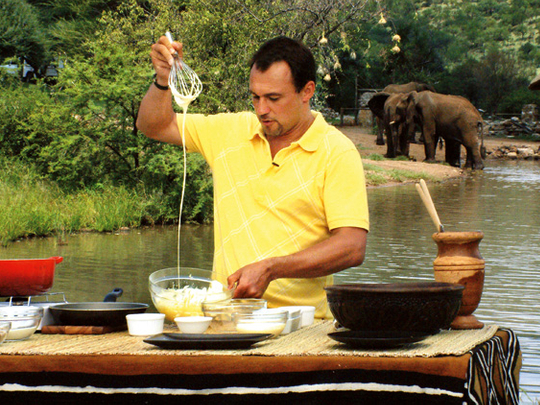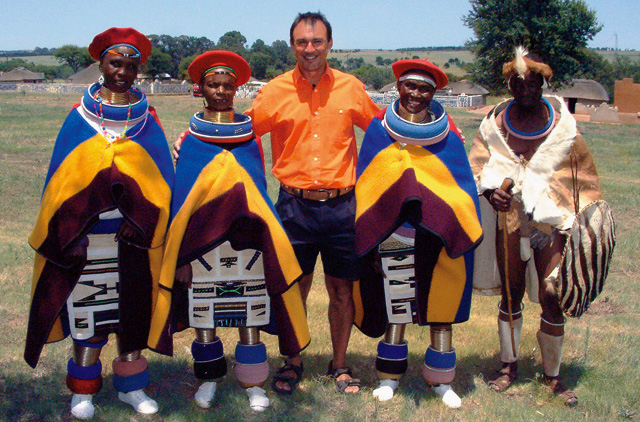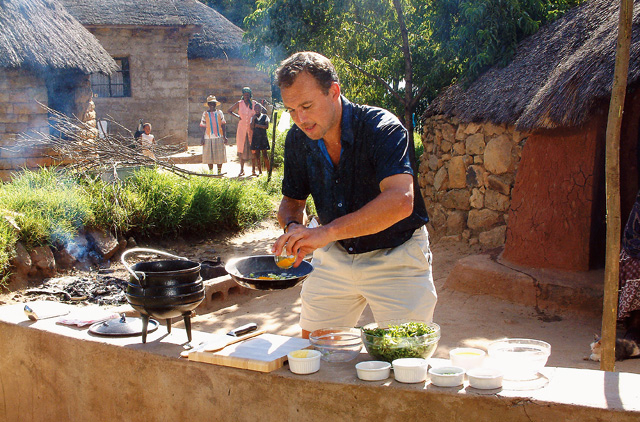
Living every moment to the hilt, the characteristic that most describes Alan Coxon is his intense desire to make the past come alive on everybody’s food plate. His passion for how our past has shaped our food preferences, pushed cultures into inventing and experimenting with ingredients and of the history of food ingredients in itself
is immense. He is tirelessly excited about it. This passion is what led him to reinvent a classic and historically valuable recipe from Medieval England, which he has calls the
Ale-Gar, putting him in the rare league of chefs who have invented food products of great value. A versatile and uniquely flavoured form of vinegar, to put it very broadly, Ale-Gar can be put to a variety of uses as well-known chefs in many restaurants in the West are attesting to.
Coxon’s passion for the history of food led the Sunday Telegraph of London to call him the Food Archaeologist. He has cooked for the likes of Frank Sinatra, Michael Jackson, Prince Charles, Grace Kelly, former British Prime Minister John Major and many other illustrious names in politics and the arts.
He has written many cookbooks, starred in many cooking shows, both on his own and as a guest, and he travels extensively to share his cooking wisdom and the wonders of his unique product line.
Coxon has now set his sights on the Middle East as the delights of Arabic cuisine beckon him.
Born in 1962 in Derbyshire to a working-class family, Alan fondly recalls how he, his two sisters, grandfather and parents lived together in the only house on the street with its own indoor bathroom. “Our neighbours all had to go outside for their ablutions!”
Looking back, Coxon says, “We were also the only family with a telephone so I suppose we were a bit better off in a way, although one doesn’t bother about such things as a child. My father was an electrician, my mum worked as an assistant in a neighbouring family’s electrical supply store and my grandfather drove a bus.”
During weekends, they would visit his other grandparents and great grandmother and the kitchen would be redolent of the aromas of bubbling rice puddings, browning breads, stock pots simmering on the hob with soups and the kettle on a perpetual bubble – those aromas stir his heart even today.
Of his school life, Alan says he wasn’t a remarkably bright child as he preferred to be engaged in athletics. But his history teacher ignited in him a passion for the glory of the past. He would dress up as the characters he was teaching about and would often walk into the class looking like historical figures such as Alexander the Great. This small flame of passion for history would soon be stoked when Coxon moved to southern France with his parents for four years – his father was offered a job there – to live a French way of life.
“I was about 12 when we moved to France. Every day I had to walk to and from school passing through a maze of stunning boulangeries and bakeries baking everything: hot crusty baguettes, courrones, butter croissants, pain au chocolat. My daily walks took me through fresh food markets offering a sensational array of cheeses and fruits unlike anything I had ever seen in England. I soon came to realise that the world outside England was vastly different. In England, we basically ate to live… but in my new home in France, people lived to eat. It was a wonderful discovery,” says Alan.
The food aromas and impressions of France provided oxygen to the small flame and it began burning brighter. Soon after school, when he was back in England, he enrolled for a two-year catering course and after that plunged headlong into the hospitality industry. By then he had also realised that he had a great desire for teaching about food so earned himself a teaching certificate from the University of Huddersfield in West Yorkshire, England.
Work
Was I ever anything like Gordon Ramsay in the kitchen? In the earlier days I probably was. At least in part since that certain way of “handling” one’s kitchen happened to be the norm back then.
I eventually outgrew that part of me and realised that the best way to work with people is through motivation and training. Work, work and more work is what makes a great chef. Doctors are called “practitioners” because they are always practicing. Lawyers are considered “learned” because they are always learning and updating their legal knowledge. Great chefs have to do both.
Yes, there is an obsession with Michelin standards in the restaurant business, one that (in my opinion) has gone a bit too far. However, it does give the world a “standard” and a general understanding of what is to be expected from a business operation thus ranked. It is an award and an achievement for the chef and his team (both front and back of house) which can be motivational and is meant to raise standards of quality. Such a “measure” is helpful in some ways but it need not be taken out of proportion.
Every step of my career may be seen as a part of the progression in my learning curve. There is not a single moment I would throw away.
My first (part-time) job was as a trainee waiter at the age of 15 where I worked evenings and weekends after school and during summer holidays. I was allowed to look after servings from the sweets trolley. I was young and always nervous.
My first real job was as a commis chef at the Villiers Hotel in Douglas in the Isle of Man. I worked at the hotel on weekends while attending to my studies in a catering college throughout the week. I also worked there during the summer until I attained my qualifications and left the island to travel and work at the Loews Hotel in Monte Carlo.
My work has given me tremendous opportunities to travel all over the world and meet fascinating people from all walks of life. I am proud to have written cookbooks and be part of people’s lives when I got involved in the television industry and got to host my own cooking show. One of the perks of being this kind of chef is being greeted and welcomed by people who would otherwise not take notice had they not seen me on TV.
Cooking in front of a live audience is certainly different from cooking in one’s kitchen. They are almost like two different careers. But one factor is common to both: the need for preparation. We call it mise en place or “everything in place”.
I take criticism very seriously. I am human but I am also realistic enough to accept that my cooking will not appeal to everyone out there. Taste is very personal, and some people have it more than others, regardless of where their roots lie. And yes, it helps to have a good sense of humour in this industry.
I am proud to be the creator of a historic food range and the globally unique Medieval Old English Ale-Gar – a product that has all but disappeared from our culinary repertoire for over 300 years. After ten years of painstaking research and development, I have managed to bring it back for the world to enjoy. Through this recent progression in my culinary career, I discovered the world of design and manufacturing since I am also behind the packaging of this product.
How is Ale-Gar made? Without giving too much away, it is made using a 15th-century Medieval Old English recipe that took me ten years to recreate. The mixture is then placed in acidulation tanks, infused and matured.
Play
As a child, I was very much into sports, playing for my county’s football team. I was fairly athletic, being one of the fastest runners in school and in the region, I was a natural choice for the centre forward position. I would play every weekend and then try to go watch the professional players in the afternoon. Back then, I always supported Nottingham Forest and would tirelessly collect autographs from the players. My programmes were always filled with their signatures, and I am pleased to say 40 years later that I still have those safely locked away!
I also enjoyed playing the drums and eventually joined a band playing gigs around the area, writing our own music and even backing for a couple of famous bands.
Family vacations were usually spent in England in holiday campsites somewhere by the sea. I remember how I had to bear the long, uncomfortable rides in our parents’ car. Cars were a great deal less reliable and comfortable back then so I always disliked having to sit in the back cramped with my sisters for what seemed to be ages.
Becoming an adult brings with it some complications. How do I relax? Frankly, I had to go and get a dictionary to check what the word “relax” means. I still play the drums whenever I get the chance… which is very little since there is always so much to do.
When I travel, it is usually for work but I never see it as work. Going to another country broadens the mind and life experiences so I hardly see it as work no matter how tight the schedule may be. I am always looking for new opportunities and interesting angles that offer something a little different for the viewer. My introduction and foray into South Africa has its birth in Birmingham, UK. I had just finished a cooking demonstration when I was approached by a woman who thanked me for giving a great presentation and said that if I ever was interested in meeting King Goodwill Zwelithini (The Zulu king), I should
let her know.
Several weeks later, I was invited to South Africa to be one of the judges for a cooking competition organised by a private food company. I took that opportunity to get in touch with the woman I met in Birmingham and she arranged for everything else. I met the King of the Zulus for dinner in Durban. In the course of conversation, I proposed a TV show featuring African royalty and African cooking/ingredients and he was quite keen on it. I then wrote a series and obtained funding support from BBC Worldwide, and the rest, as they say, is history. I also love the Far East for the many different cultures and cuisines it possesses. I would love to explore India and the Middle East very soon; it’s already in my itinerary.
Dream
Like many people, I still have a lot of plans and dreams up my sleeve. Having said that, the road to fulfilment is never easy.
I want to host a TV show that will be called The Food Archaeologist. For eight years now, I have been proposing a series that would explore the past to search for, and discover, the birthplace of the every ingredient that we consume today. I wish to trace every ingredient’s history because nations and cultures have come together because of them, fought over them, used them as peace flags and benefited from them as currency. I see myself as the Indiana Jones of the food world. My TV show will feed both the mind and the palate.
Another dream is to see my product become a global favourite. The global recession has not made it easy for producers like me to market something new. The range has now won five Gold International Innovation and Superior Taste awards for its quality but I have yet to find the right distribution channels to market it worldwide.
I still have 36 new products to launch as an extension of the Ale-Gar historic food range.
I cannot divulge much about what they are at the moment but these items fit in with the historic Old English, Roman and Ancient Greek themes that I have focused on as a food archaeologist. I would also love to run a bed-and-breakfast with a deli, and have my own little farm with geese, chicken and the lot, and make cheese, butter, cured meats and much more.
What would I like to share as my brand of wisdom? Always hold on to your dreams no matter how impossible they may seem at the moment. They will help you find the path. Mankind’s many discoveries and inventions were born of the deepest hopes and dreams.
(Anyone interested in discovering Ale-Gar and ordering his product can visit Alan Coxon’s website: www.alancoxon.com.)













